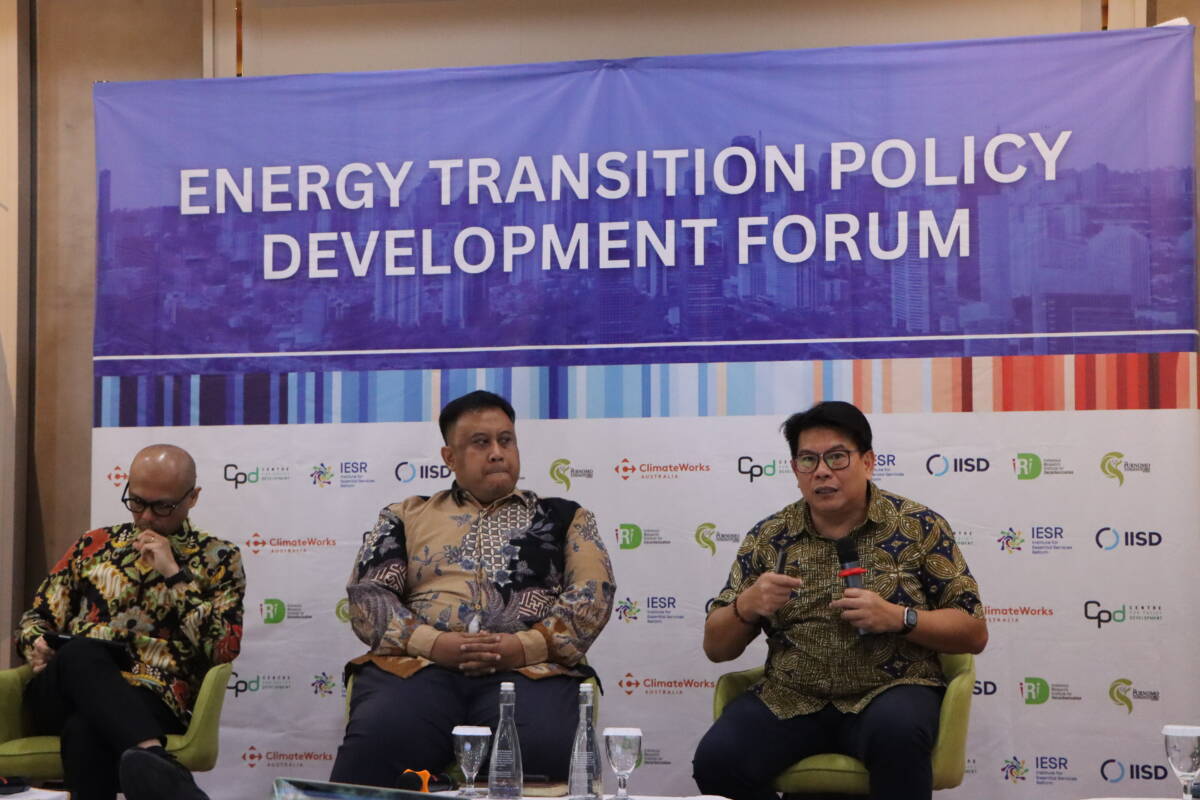Jakarta, November 11, 2025 – The administration of Prabowo Subianto and Gibran Rakabuming Raka officially completed its first year on October 20, 2025. In its first year of leadership, Indonesia has shown a strong commitment to the energy transition. This commitment was conveyed in various national and international forums such as the G20 Brazil 2024 forum, a joint statement with the President of Brazil, and a significant speech at the UN General Assembly that affirmed Indonesia’s commitment to reducing emissions and accelerating the transition towards renewable energy. This was revealed by the Chief Executive Officer (CEO) of the Institute for Essential Services Reform (IESR), Fabby Tumiwa, at the Energy Transition Policy Development (ETP) Forum Media Briefing titled “Reflecting on the Energy Transition and Climate Ambition in the First Year of the Prabowo-Gibran Administration” on Monday (10/11).
“In the first half of 2025, Indonesia’s total renewable energy mix reached 16%, with an additional renewable energy (RE) power plant capacity of 876.5 MW. Although still far from the desired target, this development shows a positive step in reducing dependence on fossil fuels. The government has also allocated a budget of Rp 402.4 trillion to enhance energy security, of which Rp 37.5 trillion is allocated to accelerate renewable energy development,” explained Fabby.
However, several challenges remain, continued Fabby, one of which is that the RE mix target is not ambitious enough and is not fully aligned with the commitments conveyed by President Prabowo, nor is it aligned with existing policies. For instance, the target of a 36-40% RE mix by 2040 in the KEN (National Energy Policy) is considered insufficiently ambitious, given that President Prabowo has committed to achieving 100% renewable energy by that year, and on the other hand, referring to the RPJPN (National Long-Term Development Plan), the RE mix target is 70% by 2045.
“In the second year of the Prabowo-Gibran administration, there are at least three energy transition challenges. First, the Government needs to ensure that policies between related ministries and institutions regarding the energy transition are well-coordinated to prevent policy fragmentation and accelerate implementation on the ground. Second, strengthening the legal framework, where stronger regulations are needed to support the development of renewable energy, one of which is by passing the New and Renewable Energy Bill (RUU EBET). Strong political commitment needs to be supported by clear regulations to increase investor confidence. Third, the government needs to integrate its economic development strategy with the acceleration of the energy transition, such as focusing on the development of the green energy sector, related infrastructure development, and the readiness of qualified human resources,” said Fabby.
Given these challenges, the Energy Transition Policy Development Forum (ETP), which consists of the Climateworks Centre, Centre for Policy Development (CPD), Institute for Essential Services Reform (IESR), International Institute for Sustainable Development (IISD), Indonesia Research Institute for Decarbonization (IRID), and Purnomo Yusgiantoro Center (PYC), provided nine recommendations for the Prabowo-Gibran Administration.
First, reforming energy subsidies towards a direct beneficiary-based subsidy scheme through the National Energy Subsidy Single Data (DTSEN) to improve targeting accuracy and fiscal efficiency.
Second, expanding access to clean energy in 3T (Frontier, Outermost, and Disadvantaged) regions through investment from subsidy savings for the development of community and cooperative-based micro, mini, and off-grid networks.
Third, strictly separating the roles of the energy business regulator and operator to enhance transparency, efficiency, and investor confidence in the national energy market.
Fourth, establishing an Energy Transition Task Force directly under the President to strengthen cross-agency coordination, synergize policies, and accelerate strategic decision-making.
Fifth, expanding the implementation of the Carbon Economic Value (NEK) to the industrial and transportation sectors and harmonizing it with the RUU EBET to strengthen the legal certainty of decarbonization.
Sixth, affirming the commitment to renewable energy development in the KEN, RUKN (National Electricity General Plan), and RUPTL (Electricity Supply Business Plan) to align with the vision of 100% renewable energy by 2040 and net zero emissions by 2060 or sooner.
Seventh, increasing investment in clean research and technology such as electric vehicle batteries, green hydrogen, and ammonia as a step to accelerate energy transformation and national industrial independence.
Eighth, implementing Environmental, Social, and Governance (ESG) standards in the downstream processing of critical minerals to ensure that economic benefits go hand-in-hand with environmental protection.
Ninth, integrating social aspects, GEDSI (Gender Equality, Disability, and Social Inclusion), and a Just Transition Framework to guarantee the protection of workers, vulnerable groups, and social sustainability in the national energy transition process.

